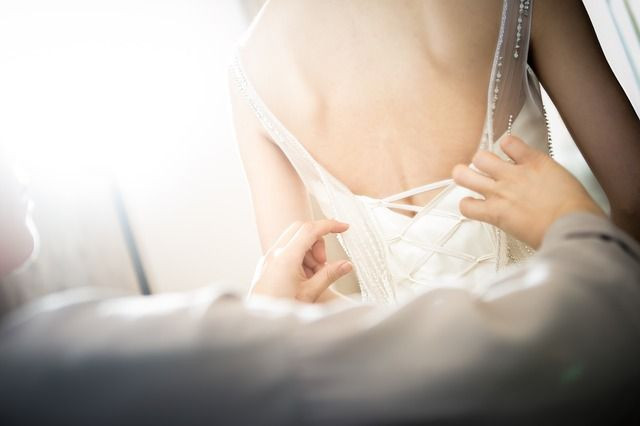Wedding Diets: When Brides Go To Extremes With Weight Loss, Workouts

With one more month of wedding season left, brides-to-be are double checking their guest lists, catering needs, reception hall... and their weight? The trend of extreme dieting and excessive exercising all come down to the big moment — when the bride walks down the aisle in her highly anticipated dress to say “I do.” The pressure to have a “picture perfect” body on your wedding day can lead to extreme behaviors that have become known as “brideorexia.”
Brideorexia isn't a psychiatric diagnosis, but a word that's used to label a dangerous set of behaviors. The term was brought into the media spotlight in 2011 when the Duchess of Cambridge Kate Middleton dropped a significant amount of weight between her engagement and wedding day - from a reported U.K. size 10 (size 6 in the U.S.) to a tiny U.K. size 6 (U.S. size 2). However, whether she developed an actual case of brideorexia is unclear.
Dr. Samantha DeCaro, the assistant director of The Renfrew Center of Philadelphia, suggests a bride's wedding-induced weight loss isn't medically indicated; it's driven by a desire to look a certain way or to fit in a certain size dress.
"Although brideorexia is a fictional disorder, the behaviors involved are just as dangerous, and could potentially trigger... an eating disorder for a genetically vulnerable bride" she told Medical Daily.
Brideorexia By The Numbers
Numbers, in this case pounds, become triggers for future brides to engage in extreme dieting behaviors. A 2007 study found that 70 percent of women who wanted to lose a lot of weight (23 pounds on average) for their wedding day had lost only a fraction of that amount (8 pounds). However, their goals were considered to be in a healthy range and their methods were reasonable, including drinking lots of water, aerobic exercise, eating less food, and eating foods with fewer calories. Meanwhile, 14 percent of brides-to-be took a risky step of buying a wedding dress that was smaller than their current body size.
In almost three decades, the obsession with losing weight for weddings has been celebrated by society with bridal boot camps, bridal workouts, bridal diet plans, and reality shows based on brides slimming down for the big day (i.e, Shedding for the Wedding). Meanwhile, in the 1990s, there were few entrepreneurial pushes to get women to lose weight.
"Of all the wedding magazines we could get our hands on, we only found one weight-loss ad,” Dr. Jeffrey Sobal, co-author of the 2007 study and a professor of sociology at Cornell, told TIME Magazine.
Society values thinness, and weddings are probably the event in a woman’s life where she’ll have the brightest spotlight on her. Unfortunately, some weight loss programs normalize and promote unsafe weight loss methods that lead brides to use and abuse diet pills, strict diets, cleanses, laxatives, starvation, and excessive exercise. This is not only physiologically, but psychologically and emotionally damaging.
Side Effects Of Brideorexia
Dramatic weight loss and malnutrition are known to reduce levels of serotonin in the brain, a neurotransmitter that contributes to feelings of happiness and well-being, while at the same time increasing levels of other chemicals that increase stress. This could lead to depression and social withdrawal, which can trigger destructive behavior in the vulnerable.
April Masini, relationship expert and author, agrees the obsession to be thin for your wedding can have consequences even on relationships.
“Dieting and starving oneself to fit into a dress that is too small for a bride’s normal body can not just affect health, it can affect mood. Most people get cranky when they’re hungry. They lose energy and their relationships suffer,” she told Medical Daily.
Moreover, the stress that couples put on themselves and each other during an engagement and wedding period can be enough to break the relationship.
Brideorexia Vs. Healthy Dieting
Now, there's nothing wrong with wanting to lose weight before your wedding day, but if it's extreme there will be rebound effects. Signs of brideorexia can vary, but one obvious sign is if a bride is thin, but insists on becoming thinner, decides on a weight goal below the healthy range, or orders a dress size significantly smaller than her usual size; these signs indicate she might be at risk for engaging in disordered eating or developing a diagnosable eating disorder, according to DeCaro. Other signs include having a weight loss plan that involves abusing diet pills or laxatives, inducing vomiting, skipping meals, and/or exercising excessively.
So, what's the safe way to diet without being a brideorexic?
Before focusing on losing weight, DeCaro suggests women should ask themselves: “Are my needs being met in this relationship?”
However, if weight loss is medically recommended before your wedding, make it a priority to include a nutritionist, physician, and/or exercise consultant in your weight loss plan, she adds.
“It’s important that the people you consult with are familiar with eating disorders so that they can easily recognize any warning signs and support you through your journey.”
After all, a woman wants to look, and feel, her best on her big day.



























